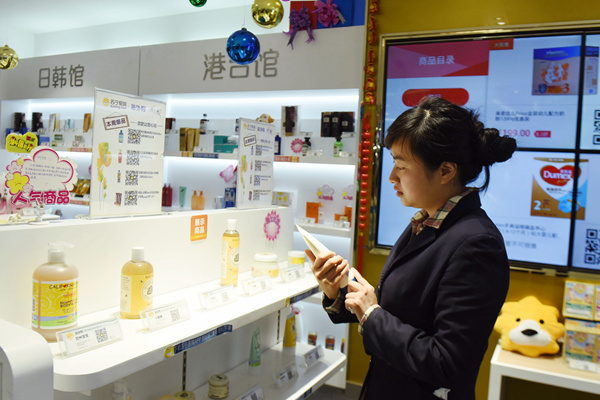
A customer selects imported items at a cross-border e-commerce experience store in Hangzhou. [Photo/China Daily]
Cross-border e-commerce in China is set to expand to a much wider population base by 2020, a survey has found.
More than 15 percent of the Chinese population purchased goods from abroad worth $85.8 billion in 2016. The amount is expected to reach 25 percent-which translates into 325 million people-by 2020, according to research firm eMarketer.
Buyers in China spent an estimated average of $473 each on cross-border purchases in 2016, representing 4.2 percent of the total retail e-commerce market, the study found.
Thanks to a combination of overseas travel, increased internet usage, and greater exposure to foreign brands, online shopping grew more than 70 percent last year, it added.
While a new cross-border e-commerce tax implemented in April will negatively affect some categories of goods, demand for foreign goods via the cross-border e-commerce channels is still expected to stay robust due to better prices compared with offline retailers, perceived quality and better variety, said eMarketer analyst Shelleen Shum.
China’s growing middle-class-which McKinsey Co estimates will reach 630 million by 2022-will drive the majority of the growth as they are hungry for authentic, good-quality foreign products.
Major sites like Tmall Global have enabled overseas brands to sell their goods directly to savvy shoppers in China via the internet.
Providing Chinese consumers with a direct sales channel to foreign retailers, Tmall Global, established in 2014, saw the number of imported product categories on the platform jump 50 percent to 3,700 by the end of last year.
Some 14,500 international brands from 63 countries and regions have opened virtual stores, 80 percent of which made their first Chinese foray through Tmall.
“E-commerce is going to play an increasingly large role in China’s broader push to encourage consumerism in a savings-rich country, and Tmall Global is seeing strong demand from the affluent younger generation,” said Daniel Zhang, chief executive officer of Alibaba Group Holding Ltd, which owns Tmall Global.
The company said 70 percent of Tmall Global customers are aged between 24 and 32 with an annual income above 100,000 yuan ($14,570). Most of them live in first- and second -tier cities, including Beijing, Shanghai and Hangzhou.
Beauty and skincare, food and beverages, and maternity products are among the top three best-selling categories.
The platform’s best-sellers include skincare products by Japan’s drug and cosmetics chain Matsumoto Kiyoshi, health supplements from Australia, and olive oil from British retailer Sainsbury’s.
Changes in lifestyle become major reasons for customers to shop via such sites. For instance, becoming a parent drives cross-border shopping for baby and maternity products. According to company figures, transactions made by new parents on Tmall Global jumped 24 times in the past three years.
A freer-spending sentiment also pushes the millennial generation to try out new products. For example, a sonic skincare brush endorsed by film stars and online opinion leaders became a trendsetter among young women. Gross merchandise volume for the item in 2016 was 13.7 times than two years ago.
Cross-border business-to-customer shopping will continue to enjoy a compound annual growth rate of 27.4 percent in the next five years, with the market ballooning to $1 trillion in 2020 from $230 billion in 2014, according to a joint report by consultancy Accenture and AliResearch, the research arm of Alibaba.
